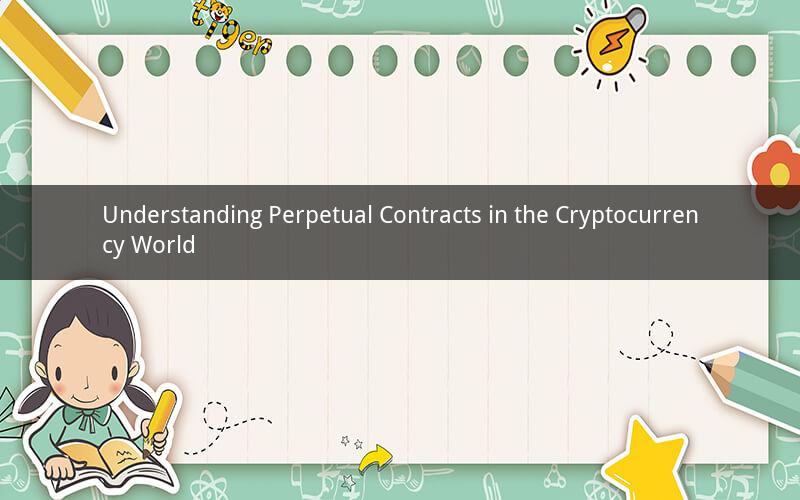
Perpetual contracts, also known as perpetual swaps, are a type of financial derivative that has gained significant popularity in the cryptocurrency market. These contracts allow traders to speculate on the price of an asset without the need for a physical delivery of the asset. In this article, we will delve into the concept of perpetual contracts, their benefits, risks, and how they differ from traditional futures contracts.
What is a Perpetual Contract?
A perpetual contract is a type of financial derivative that enables traders to speculate on the price of an asset without an expiration date. Unlike traditional futures contracts, which have a predetermined expiration date, perpetual contracts are designed to mimic the price movements of the underlying asset indefinitely. This means that traders can hold their positions for as long as they wish, without worrying about the contract expiring.
How Do Perpetual Contracts Work?
Perpetual contracts are based on a price feed, which is a real-time data source that provides the current market price of the underlying asset. Traders can take long or short positions on the contract, depending on whether they believe the price of the asset will rise or fall. When a trader takes a long position, they are essentially betting that the price of the asset will increase, while a short position means they expect the price to decrease.
Benefits of Perpetual Contracts
1. Leverage: Perpetual contracts offer high leverage, allowing traders to control a larger position with a smaller amount of capital. This can amplify profits, but it also increases the risk of losses.
2. No Expiration Date: Since perpetual contracts have no expiration date, traders can hold their positions indefinitely, providing flexibility and the ability to trade based on long-term market trends.
3. Daily Funding Rate: Perpetual contracts have a daily funding rate, which is a mechanism that helps maintain the price of the contract close to the underlying asset's price. This rate can be positive or negative, depending on the market conditions.
Risks of Perpetual Contracts
1. Funding Rate: The daily funding rate can be a significant risk factor for traders. If the rate is negative, traders holding long positions may have to pay funding fees, while those holding short positions may receive funding fees. This can impact the profitability of a trade.
2. Market Manipulation: Perpetual contracts are subject to market manipulation, as traders can influence the price feed. This can lead to unfair trading conditions and potential losses for unsuspecting traders.
3. High Leverage: While leverage can amplify profits, it can also lead to rapid losses. Traders must be cautious and use proper risk management techniques to mitigate potential losses.
Difference Between Perpetual Contracts and Traditional Futures Contracts
1. Expiration Date: The most significant difference between perpetual contracts and traditional futures contracts is the expiration date. Perpetual contracts have no expiration date, while futures contracts have a predetermined expiration date.
2. Funding Rate: Perpetual contracts have a daily funding rate, which helps maintain the price of the contract close to the underlying asset's price. Traditional futures contracts do not have a funding rate.
3. Trading Hours: Perpetual contracts are traded 24/7, while traditional futures contracts have specific trading hours.
4. Counterparty Risk: Perpetual contracts are traded on decentralized exchanges, which eliminate counterparty risk. Traditional futures contracts are traded on centralized exchanges, which can be subject to counterparty risk.
Frequently Asked Questions
1. What is the difference between a perpetual contract and a futures contract?
Answer: The main difference is that perpetual contracts have no expiration date, while futures contracts have a predetermined expiration date.
2. How does the funding rate affect my perpetual contract position?
Answer: The funding rate can affect your position by either charging you a fee or paying you a fee, depending on whether the rate is positive or negative.
3. Can I lose more money than I invested in a perpetual contract?
Answer: Yes, due to leverage, you can lose more money than your initial investment.
4. Are perpetual contracts safe to trade?
Answer: Perpetual contracts can be risky, especially for inexperienced traders. It is essential to understand the risks and use proper risk management techniques.
5. Can I trade perpetual contracts on any exchange?
Answer: No, not all exchanges offer perpetual contracts. It is important to research and choose a reputable exchange that supports perpetual contracts.
In conclusion, perpetual contracts are a unique financial derivative that offers traders the opportunity to speculate on the price of an asset without the need for a physical delivery. While they come with their own set of risks, understanding the concept and utilizing proper risk management techniques can help traders capitalize on the benefits of perpetual contracts.